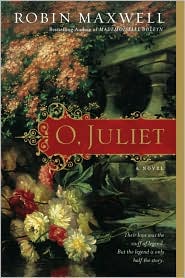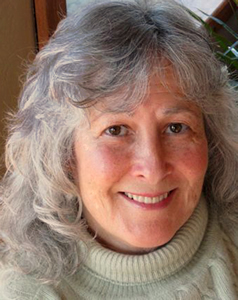O, JULIET is the first retelling of the immortal story of the star-crossed lovers, Romeo and Juliet, told in the form of a novel.
2) What compelled you to choose to rewrite the classic Romeo & Juliet?
I had been desperately trolling around for months after finishing SIGNORA DA VINCI, a project that was so research-intensive I thought my head was going to explode. That book was a hard act to follow with its rich, colorful real-life characters and civilization-changing events. Also, I was distressed to realize that with so many historical fiction authors out there (so many more than when I started in 1997) that all the well-known historical figures had been done and done to death, and every waiting lady, royal cousin, seamstress, confectioner and bastard child had also been snatched up for a book. How was I going to be original in this climate?
 Then I read that that Susan Fraser King had written a historical fiction called LADY MacBETH. That stopped me in my tracks. “Brilliant!” I thought, “Use a literary figure instead of an historical one.” I had loved Sena Jeter Naslund’s AHAB’S WIFE (a wonderful adventure and beautifully drawn heroine gleaned from a single reference in Melville’s MOBY DICK about Captain Ahab’s wife). But why go any farther than Shakespeare? It took me another split second to come up with “Romeo and Juliet” for myself, only the most romantic tale ever told. I’d always wanted to write a great love story. And best of all, I realized with more than a touch of disbelief, nobody had ever written it as a novel. It took place close to the period and in the same part of Italy as SIGNORA DA VINCI, so I wasn’t going to have to kill myself with research. It was an easy-peasy pitch to my agents and publishers. Everybody LOVED the idea from the first moment.
Then I read that that Susan Fraser King had written a historical fiction called LADY MacBETH. That stopped me in my tracks. “Brilliant!” I thought, “Use a literary figure instead of an historical one.” I had loved Sena Jeter Naslund’s AHAB’S WIFE (a wonderful adventure and beautifully drawn heroine gleaned from a single reference in Melville’s MOBY DICK about Captain Ahab’s wife). But why go any farther than Shakespeare? It took me another split second to come up with “Romeo and Juliet” for myself, only the most romantic tale ever told. I’d always wanted to write a great love story. And best of all, I realized with more than a touch of disbelief, nobody had ever written it as a novel. It took place close to the period and in the same part of Italy as SIGNORA DA VINCI, so I wasn’t going to have to kill myself with research. It was an easy-peasy pitch to my agents and publishers. Everybody LOVED the idea from the first moment.3) Did you try to stay true to known “facts” (if legends can include such) or did Juliet’s story take on a mind of its own?
I decided from the get-go that I was not going to compete with Shakespeare. How could I? He, in fact, had stuck pretty closely to the basic story points — hard to call them “facts” — that the three Italians short story writers had used in the century before him. But the Bard invented Juliet’s nurse, and Paris (the young man Juliet was betrothed to), and gave the helpful cleric (Friar Lawrence) and Juliet’s cousin whom Romeo kills (Mercutio) names and distinct personalities.
I took similar liberties, going even further. I lost Juliet’s nurse altogether, as my Juliet is four years older than Shakespeare’s heroine. Besides, I wanted my Juliet to have more freedom to move around and see Romeo privately. I made her cousin a character who is much more central to the action and a closer family member than Mercutio had been. My friar (Bartolomo) is a well-known figure in Florence and tied into my Dante sub-plot. And since I’m a firm believer in really bad “bad guys,” I created the character of Jacopo Strozzi to replace Paris as Juliet’s family-approved suitor, even giving him a “dragon lady” mother.
Shakespeare’s play takes place over a few days. I felt that was not nearly enough time to expand my characters, add scenes of Romeo’s peace-making between the families Monticecco and Capelletti (both names from the older Italian short story), get to know Romeo’s wonderful parents, give Romeo a calling that he loved (olive growing), and situations in which Juliet and her best girlfriend can confide in each other.
Lucrezia Tornabuoni (that girlfriend) is a major addition, and one of my favorites. Those of you who read SIGNORA DA VINCI (that takes place several decades later than O, JULIET) will remember her as the fabulous mother of Lorenzo de’ Medici and materfamilias of that powerful Florentine family. Here she is an 18 year old girl on the verge of her marriage, and a devoted friend to Juliet. Extremely bright, though rather conservative and conventional, she is frequently freaked out by Juliet’s outrageous behavior.
So you can see I didn’t feel constrained by Shakespeare’s play, or the Italian short stories. I just freely used what worked for my purposes and left the rest “on the cutting room floor.” I’m sure I’ve ruffled a few feathers, but that was a risk I was wiling to take, and I’m confident that there’ll be plenty of readers who will be happy with my take on the iconic legend.
4) Do you see yourself as any of the characters from any of your novels?
Juliet, of course! I recently told Max, my husband of twenty-six years, that I could never have written O, JULIET if it hadn't been for our enduring love for each other. We're not youngsters anymore, nor were we kids when we met (he was 41 and I was 35), but we came from wildly different backgrounds, and the early years of our relationship were emotionally and physically passionate. As time went on we lived through some really tough, and even dangerous times, but our love grew stronger from the adversity. That's why, when I began to write O, JULIET, despite the fact that Max's and my story didn't fit the circumstances of Romeo's and Juliet's love, there was a deep well of memories and emotions for me to draw from. If you'd like to see me discuss my personal Romeo and Juliet story and find out how my surrounding affect my writing, check out these two different Youtube videos.
There is also a second, shorter video of me telling the story of my husband and I escaping from a catastrophic and deadly firestorm (complete with dramatic fire footage) on our property.
About Robin Maxwell:
Robin Maxwell grew up in New Jersey and graduated from Tufts University with a degree in Occupational Therapy. And later went on to become a parrot tamer, casting director and screenwriter in Hollywood. She has worked in comedy, drama and even animation with Disney Animations. But along the lines of screen writing, Robin started to become obsessed with the 15th and 16th century and women that were ahead of their time. From that she has released several historic novels based around the lives of some very famous people.Books that Robin has written included: Secret Diary of Anne Boleyn, The Queen's Bastard, Virgin, The Wild Irish, To the Tower Born, To the Tower Born, Mademoiselle Boleyn, Signora Da Vinci, and now O, JULIET. She resides in California with her husband, Max.
Thank you to Robin for allowing me to interview her for my first ever author interview! I'm hoping to read some more of her books in the future (first maybe I should get through some of these books I have in my TBR pile).
Thank you to Robin for allowing me to interview her for my first ever author interview! I'm hoping to read some more of her books in the future (first maybe I should get through some of these books I have in my TBR pile).







2 Loud Comments:
Good interview! And the book sounds very interesting!
:D
Thank you! The book was amazing, to say the least.
Post a Comment
Thank you for leaving a "loud" comment, I read every single one. And take any feed back into consideration.